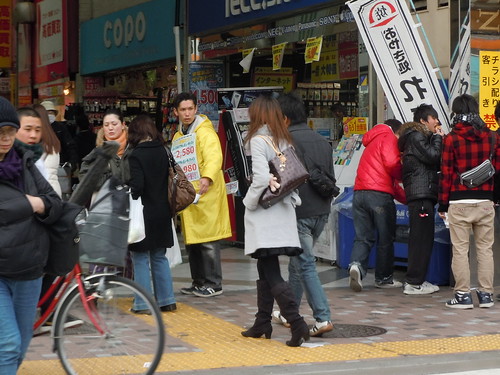
I took the above photo a couple of days after the 3.11 earthquake, mainly to illustrate the amazing speed with which Tokyo returned to everyday normality. The guy in the middle is just one subtype of an eternal Tokyo presence - the sidewalk promoter. He's giving out flyers (and probably tissue packages) to promote a contact lens shop, but you'll also see people doing much the same work in service of Italian restaurants, Karaoke boxes, manga kissaten, Korean barbecues, and hostess clubs (including the vile subspecies who harass passing young women to try and lure them into the sex industry).
I've lately been thinking about how little I understand the human element of a job like this. It's just one of a variety of undeniably crappy jobs you see people doing every day in a city like Tokyo, from fast-food server to Donki clerk to construction-site traffic-director. The last time I worked a job of this sort was about a year ago, when I did short stints as a parking-lot attendant and line-cook as part of my confused attempts to deal with unexpected funding shortfalls in my last year of grad school. Both were part-time jobs, and the line cook job was actually a hell of a lot of fun, but I ended up quitting both jobs with no notice in moments of frustration and/or overwork.
I had that option, because I knew I was on my way to other things, but I was nonetheless able to hold onto some (facile, superficial) sense of solidarity with "workers," thanks to my cushioned, provisional version of poverty, and the genuinely merciless grind of grad school, in some ways undeniably more demanding and even exploitative than this sort of service job.
Now, though, I'm realizing how much that illusion of lived solidarity was insulating me from a real consideration of the challenges posed by living in a mercilessly stratified society. Job-wise, I'm now living a ridiculous fantasy, which if not quite financially secure does happen to include total freedom. I'm suddenly not sure how to feel about the legions of workers through whom I float, to whose daily struggle I find it more and more difficult to truly relate.
Being a fake-poor student helped me ignore - emotionally, if not intellectually - the role of luck and privilege in helping me along my path. I was raised in a solid household, my parents have been able to give me a small amount of financial help, and perhaps most importantly, they instilled in me a huge degree of self-confidence. And of course, let's not forget that I've now milked white privilege on both sides of the Pacific Ocean.
This makes my feelings about the tissue distributor pretty difficult and complicated. Not infinitely complicated - every single person who has to work a job they hate is a victim of shortcomings in our society. And I consider it my obligation as someone who has dodged that bullet to work for improving the system, even if at present that takes the form of a rather indirect effort to oppose fascistic tendencies in pop culture.
But on the other hand, it's a challenge to think about people as victims of society without dehumanizing them to at least some degree. Each person must make their own choices, choices which are expressions (or, less tritely, constitutions) of who they are. In terms of interpersonal relationships, noone wants to be pitied, with its inevitable condescension. That's been one vital discovery of my research on music - at least some small minority of these people are doing these shit jobs by choice, because work is not the most important thing in their lives, and they are actually able to be happy without having "proper" careers. (This is, incidentally, just a slightly more direct version of a quandary that paralyzes some media theorists - how do you indict the mind-control-like powers of media while still leaving plenty of space for the agency of individual interpretation and critical reading?)
Nonetheless, there's one powerful, undeniable reality - my own frequently recurring guilt whenever I interact with someone in this sort of job. It's the same sensation I felt recently when listening to This American Life chronicling five job candidates desperately hoping to land a $20,000 a year telemarketing gig. One twenty-year-old's ecstasy at being hired was deeply uncomfortable for me to listen to (as I think the producers intended, as their audience is probably largely composed of people who feel the same way). The distance between me and these people is so huge, and while I certainly am not without constant, sometimes debilitating anxiety over my precarious career, all signs point to the gap growing even further in the coming years. While I've pretty well traversed/dodged the grinding gears of capitalism, these are people who are pummeled by them daily. After nearly a decade of (posh, drunken, student-variety) poverty, I'm finding the transition into the middle class impossibly bittersweet.
This guilt is distinct from our feelings towards the destitute or homeless, because there is no easy way to alleviate it - there is no equivalent, for the working class, to going to work at the soup kitchen or donating old coats. Because these are not people who have 'fallen through the cracks' in a way that we can patch up piecemeal. These people are the very fabric and foundation, essential parts of the way society is actually supposed to be (and I'm by no means suggesting that Tokyo freeters are the abused bottom of the global barrel). They are essential to capitalism, in both senses. If we regard them as tragic, we can't hold back from making the same judgment of our society as a whole.
No comments:
Post a Comment